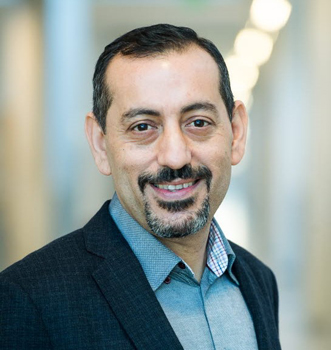Professor's portrait: Moris Behnam

Moris Behnam is one of the professors to be installed at the Academic Ceremony on 7 October 2022.
Moris Behnam, Professor, School of Innovation, Design and Engineering, Division of Product Realisation.
Please tell us briefly about your academic career – what decisions have brought you to where you are today?
I earned my bachelor and master degrees in control and computer engineering at the university of technology in Iraq in 1995 and 1998. After graduation, I continued my connection with academia and worked as a part-time lecturer. In Sweden, I worked as a system developer at a company, and I was first introduced to the real-time systems field, which I found very interesting and complimented my previous study. I decided to do another mater in real-time systems at Mälardalen University. My master thesis won the Bengt Asker awards as the best master thesis in 2005. In 2006 I started my Ph.D. in real-time systems and graduated in 2010. I did my Postdoc at the University of Porto, Portugal, and returned to MDU as a researcher, then senior lecturer, and associate professor in 2011, 2014, and 2018 respectively.
In 2019 I applied for a professor position in the production and product development division with aim of connecting activities in research and education between the Embedded Systems and Innovation and Product Realization specializations at MDU.
During my work at MDU, I have carried out research, participated in and led projects with close collaboration with the industry, and developed courses and programs. In addition, I was the coordinator of the master program in embedded systems, division leader of Networked and Embedded Systems, and currently, I am the research director of Innovation and Product Realization specialization.
In what area do you conduct research?
My research focuses on developing industrial IT infrastructure enabling innovative and intelligent solutions to be implemented in industrial systems. My research includes connecting devices and machines through the internet of things technologies, usage, and adaptation of computer platforms, including cloud computing, to execute intelligent algorithms targeting industrial systems. Providing proper IT infrastructure is an essential component in the digitialization journey, an area that is gaining significant attention as digitalization and digital transformation become mandatory for industry and society and will have a significant positive impact, if used correctly, on future sustainability.
How would you describe your research environment at MDU?
The excellent environment at MDU was the main reason I decided to stay in academia. MDU research environment promotes collaboration among researchers at MDH, with industry and public sectors making it one of the unique environments in Sweden.
What is the driving force in your research?
Producing high-quality research, collaboration with other researchers, applied research where solutions are tested in practical systems, and publishing in high-ranked journals and conferences.
Which research domains are particularly important for you?
Real-time systems, industrial internet of things, and cloud computing.
How do you feel about becoming a Professor given that MDU has recently become an official University?
MDU becoming a full university is the results of hard and very professional work done by many people at MDU, and I am proud to be one of the contributors. Our research volume will increase and provide opportunities to attract more talentedstudents and researchers to join us, which will provide more resources to work on the important industrial and societal challenges. It will be fun to work with my existing and new colleagues.
What's the best part about conducting research at MDU?
The flexibility that the university provides is such that improvements can take place faster. Also, the support provided by the university for collaboration, including our collaboration platforms, makes contact with the industry and public sector easier. And finally, the involvement of staff members in making strategic decisions.
